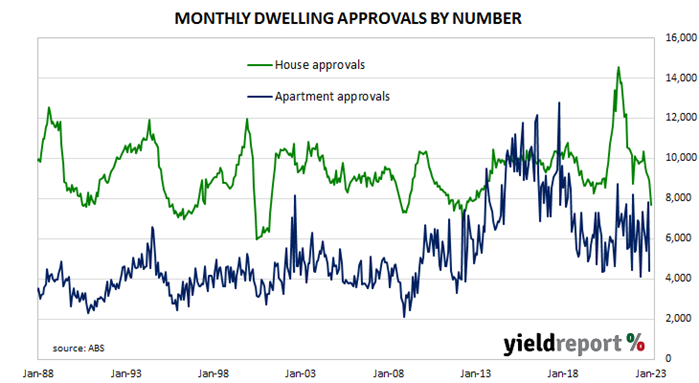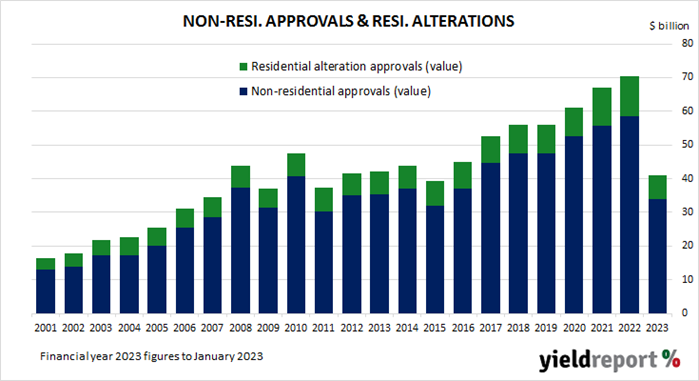Summary: Home approval numbers down 27.6% in January, below expectations; 8.4% lower than January 2022; Westpac: consistent with broader evidence of wider correction in housing market; house approvals down 13.5%, apartments down 43.6%; non-residential approvals down 25.6% in dollar terms, residential alterations down 4.0%.
Building approvals for dwellings, that is apartments and houses, headed south after mid-2018. As an indicator of investor confidence, falling approvals had presented a worrying signal, not just for the building sector but for the overall economy. However, approval figures from late-2019 and the early months of 2020 painted a picture of a recovery taking place, even as late as April of that year. Subsequent months’ figures then trended sharply upwards before falling back in 2021 and 2022.
The Australian Bureau of Statistics has released the latest figures from January which show total residential approvals dropped by 27.6% on a seasonally-adjusted basis. The fall was a considerably larger one than the 7.5% decrease which had been generally expected and it contrasted with December’s 15.3% rise. Total approvals fell by 8.4% on an annual basis, down from the previous month’s figure of -3.7%. Monthly growth rates are often volatile.
“While consistent with the broader evidence around the wider correction in the housing market, seasonal volatility again looks to be playing a clear role, warranting caution against reading too much into the sheer size of the monthly decline,” said Westpac economist Ryan Wells.
Commonwealth Government bond yields rose on the day, somewhat following overnight movements of their US Treasury counterparts. By the close of business, the 3-year ACGB yield had added 6bps to 3.58%, the 10-year yield had gained 8bps to 3.87% while the 20-year yield finished 6bps higher at 4.20%.
In the cash futures market, expectations regarding future rate rises remained largely unchanged. At the end of the day, contracts implied the cash rate would rise from the current rate of 3.32% to average 3.495% in March and then increase to an average of 3.875% through May. August 2023 contracts implied a 4.15% average cash rate while November 2023 contracts implied 4.175%.
Approvals for new houses fell by 13.5% over the month, down from -2.1% in December. On a 12-month basis, house approvals were 12.2% lower than they were in January 2022, up from December’s comparable figure of -12.9%.
Apartment approval figures are usually a lot more volatile and January’s total dropped by 43.6% after a 44.5% jump in December. The 12-month growth rate fell from December’s revised rate of 9.5% to -0.7%.
Non-residential approvals fell by 25.6% in dollar terms over the month but were still 34.2% higher on an annual basis. Figures in this segment also tend to be rather volatile.
Residential alteration approvals decreased by 4.0% in dollar terms over the month but were 1.0% higher than in January 2022.



